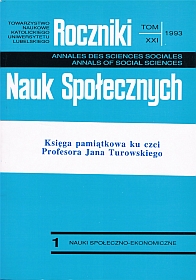Język a świadomość narodowa na przykładzie polskich mniejszości narodowych w krajach bałtyckich, na Białorusi i na Ukrainie
Abstrakt
Language is generally considered to be the factor that decides the question of national consciousness. However, this conviction is wrong. The Polish national minorities in the Baltic countries, Byelorussia and the Ukraine are an interesting example here. They have lost, sometimes in an overwhelming majority, the knowledge of the Polish language, but they have maintained the Polish consciousness. According to the census conducted in the USSR in 1989, in Latvia 27.3% of those who declared that they were of Polish nationality indicated Polish as their mother tongue, 54.1% indicated Russian, and 14.7% - Lettish. In Lithuania the proportions were: Polish - 85.0%; Lithuanian - 5.0%; and Russian - 9.2%. In Byelorussia only 13,3% Poles indicated Polish, 63.8% - White Russian (dialect), and 22.5% - Russian. In the Ukraine the proportions were: Polish - only 12.5%; Ukrainian - 66.6%; and Russian - 20.2%.
As far as Latvia, Byelorussia and the Ukraine are concerned, the loss of the Polish language by the Polish population resulted from the policy of assimilation conducted by the Soviet authorities as well as from lack of any Polish institutions that could support its knowledge. As the above examples show, knowledge of the Polish language was not the most important factor in national self-identification for Poles in the USSR. It was the Roman-Catholic denomination and the religious life based on this very language that were decisive. Since the population considered here is one that is living on the ethnic-cultural borderland, the role of religion as the basic indicator of ethnic identification was in this case much bigger than in any other region. National consciousness is not unconditionally tied to the knowledge of the language of one's nationality.
Copyright (c) 1993 Roczniki Nauk Społecznych

Utwór dostępny jest na licencji Creative Commons Uznanie autorstwa – Użycie niekomercyjne – Bez utworów zależnych 4.0 Międzynarodowe.


